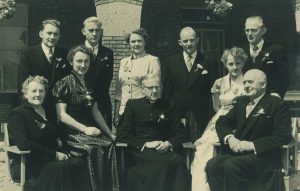
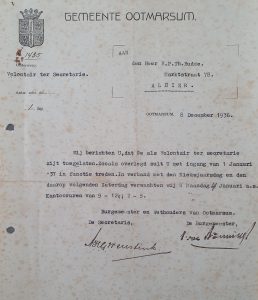
My father, Herman Budde, was born on 1 December 1920 as the second child of Theodoor Budde and Marie van Olffen. Both parents were active in the local social life. Theo was a watchmaker and had a business in antique wares. He was very involved with Ootmarsum, wrote beautiful poems about his beloved town – which are still recited in Ootmarsum – and he was the president of the local tourist organisation and heavily involved in local heritage. I feel rather connected with him.
It is at a time of economic crisis that my father first appears in his own archive. Thanks to the mediation of his father, Herman as a 16-year-old he got, on 1 January 1937, a job as a volunteer as a civil servant at the Council Office of Ootmarsum (no pay!). The following year this was changed to a paid position with an annual salary of 100 guilders! (See also Life in the Netherlands between WWI and WWII)
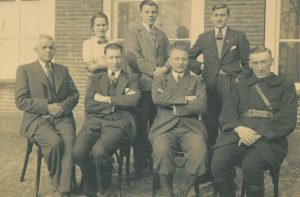
The headmaster of St Radboudschool M.U.L.O (high school) in Oldenzaal had also contributed to this. On 23 November Herman receives a letter from headmaster Mr. M.J.Gremmen stating that he is a good student and that in August 1937 he will almost certainly pass his M.U.L.O. diploma and that his behaviour is not to be criticised (Archive number 74). Two weeks later on 8 December he received his appointment letter signed by Town Clerk Antoon Weustink and Mayor Jonkheer E. Von Bönninghausen (Archive number 75).
The picture on the left show several of the people who played role in the story of Anny and particular Herman’s war history. Herman top right. 2nd. next to him his friend and colleague Henny Lohuis. Left sitting is Antoon Weusting, town clerk. This is the same Weustink who, five years later, when he had become the NSB mayor of Oldenzaal, had Herman arrested for resistance work and who during the rest of the war did not leave a stone untouched to get him punished more severely (Concentration camp
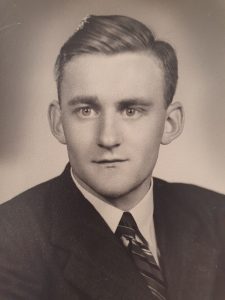
Bergen Belsen was mentioned in this context). He wanted to know from Herman who the other resistance fighters in Ootmarsum were. Unfortunately for him,he didn’t succeed in that. Mayor Von Bönninghausen next to him on the right became a fanatic Nazi supporter and even fought for them and died on the battlefields in Russia. Finally Constable Jan Rorink – in uniform – he was a ‘soft’ collaborator – had the opportunity to betray Anny, but despite his sympathy for the Germans, he didn’t do that.
As mentioned, my father never talked much about his war experiences. We must make do with only a few personal stories. But he has kept a good archive. This was his first archive, because during the rest of his professional life he had many other archives under his care (council archives of the cities of Vught, Megen and Oss).
His archive begins in 1931 with the documentation with school reports. This is followed by the appointment at the Council of Ootmarsum, next the run-up to his military conscription, his placement in the barracks in Hoorn and then back to Ootmarsum, his arrests, employment in Germany and then the liberation of Ootmarsum.
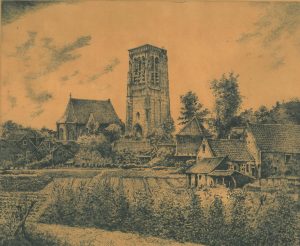
After the war, his personal archive continued mainly about his work as a council director in Vught and in Oss.
His appointment in Vught remains, an interesting coincidence. Five years after he was imprisoned in the concentration camp here, he worked in the same town at the local Council. He never ever spoke one word about this with my mother when they most certainly walked through same streets that he walked on from the train station to the prison. I find this hard to comprehend.
I have numbered his archives and further information is provided in the Dutch book (also online).
Next: Herman’s Mobilisation and the start of the war 1939-1940